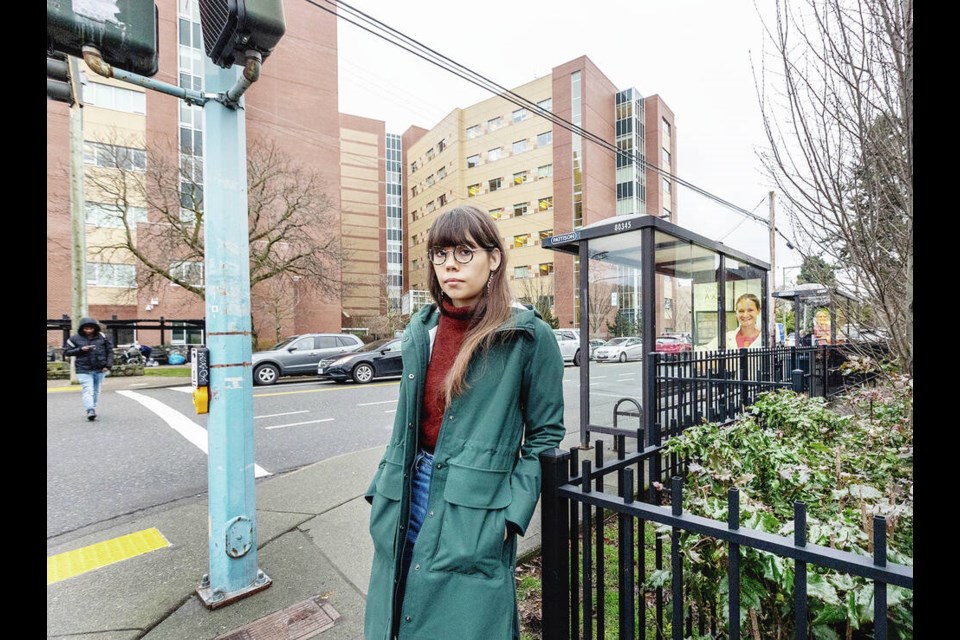Julianna Nielsen was looking out from her apartment across from Royal Jubilee Hospital on Sunday evening when she saw four security guards escorting a woman to a bus stop in front of her building.
The woman was screaming, so Nielsen rushed out to help her, and found her lying at the bus stop at the intersection of Richmond and Bay streets, cold and in a sedated-like state.
Nielsen said the woman, who was wearing a hospital wristband, said she was homeless.
Nielsen brought a blanket for the woman, who would remain at the stop for close to an hour, until a bus rider called 911, and paramedics arrived and put her in an ambulance.
Security guards from the hospital then walked to the bus stop to tell paramedics the woman had been discharged. At that point, the ambulance took the woman back to the hospital parking lot.
She was left outside in a wet motorcycle parking spot while security guards and a nurse tried to determine their next course of action. While the woman was still lying on the ground, a security guard approached a Times Colonist reporter and asked that any videos taken of the woman in the hospital parking lot be deleted, citing patient confidentiality.
It’s unclear what happened to the woman after that.
Nielsen said she often looks out to see discharged patients being escorted by security to the bus stop and left there, sometimes crying out for assistance, and has videos of such incidents dating back to 2021.
“I feel overwhelming frustration with how these patients are being treated and dehumanized,” said Nielsen, a university administrator. “It’s definitely not a one-off.”
Nielsen said many people left at the bus stop seem confused and some appear to be in pain. “I hear people begging for help.”
While she was pleased to see the number of people who checked on the woman Sunday night — including the one who called 911 — she wants to see more accountability from the Health Ministry and a better patient-discharge process.
Pierce Nettling, who lives next door to Royal Jubilee Hospital, said he’s also witnessed people being brought to the bus stop and left, wearing hospital garb and carrying a bag of their belongings.
“This bus stop is being used as a dumping ground,” said Nettling, calling it a “vicious circle” where the patient is discharged and dumped, only to return again.
“Someone is being dragged who is clearly in distress and should not be outside a hospital and is brought to a bus stop and sometimes falls into the street and everyone knows [about it],” he said.
“From the neighbourhood perspective we feel trapped — there’s nothing we can really do, nothing we can really say — who are we supposed to call in these situations?”
Health Minister Adrian Dix was not available Monday but Marko Peljhan, Island Health vice-president of clinical services for central and south Vancouver Island, said it’s important not to draw conclusions from any individual situation.
Royal Jubilee Hospital discharges almost 20,000 patients a year, and emergency department staff may give patients bus tickets or taxi chits if they are unhoused or vulnerable, he said. In some cases, security guards may help discharged patients get into taxis or get to the bus stop.
“There are times absolutely where we discharge folks that do not have a means to get to where they need to go next, so we do support with bus tickets and taxi vouchers,” he said.
Patients who are discharged must be medically stable and no longer need medical care, Peljhan said.
There’s a discharge process and care teams, social workers and other staff support patients when they leave hospital, he said. The health authority works with families, support networks, community partners, shelters and housing officials, he said, adding: “We’ve at times supported temporary hotel stays if there are not other options.”
Peljhan said it’s a struggle to discharge “somebody that doesn’t have a home to go to.”
“It’s absolutely a challenge that we’re finding in our urban centres on the Island.”
Generally speaking, he said the health authority wants to look at how it can improve discharging processes to better support patients.
>>> To comment on this article, write a letter to the editor: [email protected]



